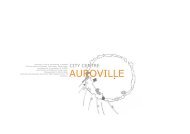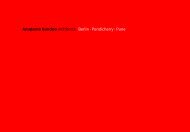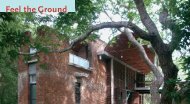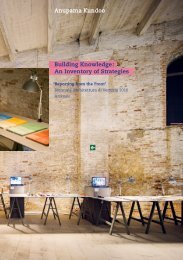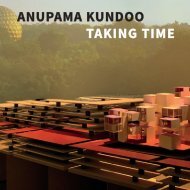Anupama Kundoo. Unbound: The Library of Lost Books
As part of the commemoration program, Tricentenari BCN, ‘Unbound: The Library of Lost Books’ was an installation built in Plaça Salvador Seguí beside the Filmoteca de Catalunya in Barcelona, in 2014. A project by Ajuntament de Barcelona, it was curated by Benedetta Tagliabue and Àlex Ollé and produced in collaboration with IaaC Institut d’arquitectura avançada de Catalunya/Institute for Advanced Architecture of Catalonia and University of Queensland, Brisbane. It is a bookless library with a live program of reading, provoking thought about the library of the future in the digital age. The focus is on the content of the book and the act of reading. ‘Unbound’, a term that relates to the description of books, also expresses liberty and the idea of plenty, of limitlessness. ‘Obsolete’ books are recycled as a construction material, to build a canopy shading the square in summer. Liberation is lightness. Light-weight structures for heavy-weight books transcend the sense of ‘weight’ to focus on the perception of the ‘light’ element of the book: content.
As part of the commemoration program, Tricentenari BCN, ‘Unbound: The Library of Lost Books’ was an installation built in Plaça Salvador Seguí beside the Filmoteca de Catalunya in Barcelona, in 2014. A project by Ajuntament de Barcelona, it was curated by Benedetta Tagliabue and Àlex Ollé and produced in collaboration with IaaC Institut d’arquitectura avançada de Catalunya/Institute for Advanced Architecture of Catalonia and University of Queensland, Brisbane.
It is a bookless library with a live program of reading, provoking thought about the library of the future in the digital age. The focus is on the content of the book and the act of reading. ‘Unbound’, a term that relates to the description of books, also expresses liberty and the idea of plenty, of limitlessness. ‘Obsolete’ books are recycled as a construction material, to build a canopy shading the square in summer.
Liberation is lightness. Light-weight structures for heavy-weight books transcend the sense of ‘weight’ to focus on the perception of the ‘light’ element of the book: content.
You also want an ePaper? Increase the reach of your titles
YUMPU automatically turns print PDFs into web optimized ePapers that Google loves.
1 Conceptual Description<br />
‘<strong>The</strong> <strong>Library</strong> <strong>of</strong> <strong>Lost</strong> <strong>Books</strong>’ is a bookless library with<br />
a live program <strong>of</strong> reading. <strong>The</strong> focus is on the content<br />
<strong>of</strong> the book and the act <strong>of</strong> reading. ‘<strong>Unbound</strong>’, a term<br />
that relates to the description <strong>of</strong> books, also expresses<br />
liberty and the idea <strong>of</strong> plenty, <strong>of</strong> limitlessness.<br />
<strong>The</strong> theme ‘liberty’ is expressed through creating a<br />
place that celebrates ‘reading’, a place that symbolizes<br />
an expression <strong>of</strong> freedom, as a place where knowledge<br />
is free. Knowledge is empowerment, and knowledge<br />
will lead to progress and freedom. This is appropriately<br />
expressed as an ‘outdoor’ place under the ‘shade <strong>of</strong><br />
trees’ where everybody has a good memory <strong>of</strong> having<br />
read a good book in the sense <strong>of</strong> freedom, free from<br />
the confines <strong>of</strong> walls <strong>of</strong> buildings.<br />
Yet, books ‘the building blocks’ <strong>of</strong> society are facing<br />
extinction. Transition/evolution in the ‘form’ <strong>of</strong> the<br />
book through time has led to books becoming lighter,<br />
losing their materiality, now <strong>of</strong>ten only virtual. However<br />
the act <strong>of</strong> ‘reading’ continues. <strong>Books</strong>, as beings in<br />
transit, pass through the hands <strong>of</strong> many readers as in<br />
libraries, rather than sitting on shelves <strong>of</strong> owners, or<br />
still with publishers. ‘Obsolete’ books locked in storage<br />
about to face their end, are rescued from pulping,<br />
brought back in circulation, and liberated, and are<br />
available for free exchange.<br />
‘Obsolete’ books will be recycled as a construction material,<br />
to build a canopy which will give shade to those<br />
who engage in ‘reading’ and ‘listening to stories told<br />
aloud’ or those engaged in ‘freely exchanging’ books<br />
without exchanging money. After dismantling, the<br />
books used to construct the canopy will be available to<br />
the public as a souvenir commemorating the event.<br />
Liberation is lightness. <strong>The</strong>se are light-weight structures<br />
for heavy-weight books that transcend the sense<br />
<strong>of</strong> ‘weight’ to focus on the perception <strong>of</strong> the ‘light’<br />
element <strong>of</strong> the book: content.<br />
Filmoteca de Catalunya at Plaça Salvador Seguí,<br />
seen from Southeast. Photo: Filmoteca de Catalunya<br />
<strong>Books</strong> made <strong>of</strong> paper are at the environmental cost <strong>of</strong><br />
trees. Recycled books are used to reconstruct trees as a<br />
symbol <strong>of</strong> the acknowledgement <strong>of</strong> these resources to<br />
create an open-air library for ‘reading’.<br />
3 <strong>The</strong> Context




